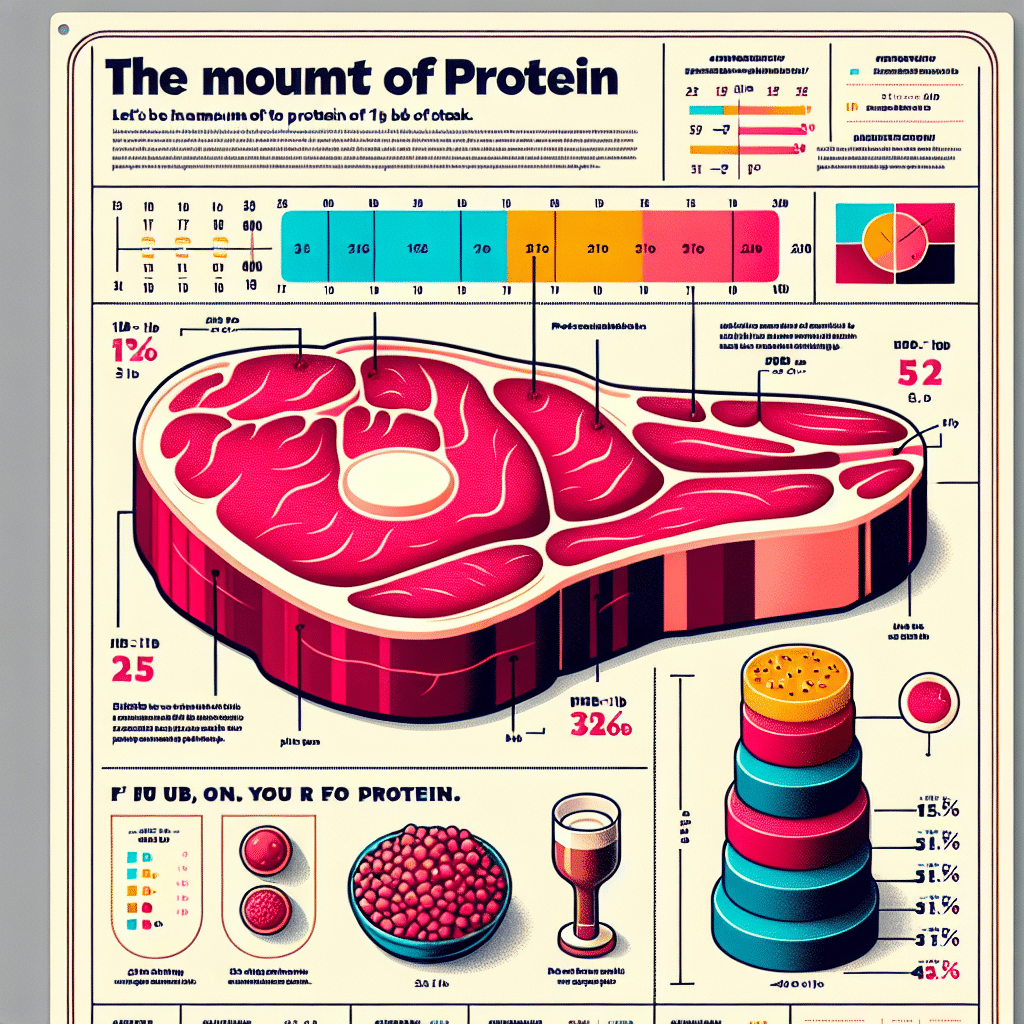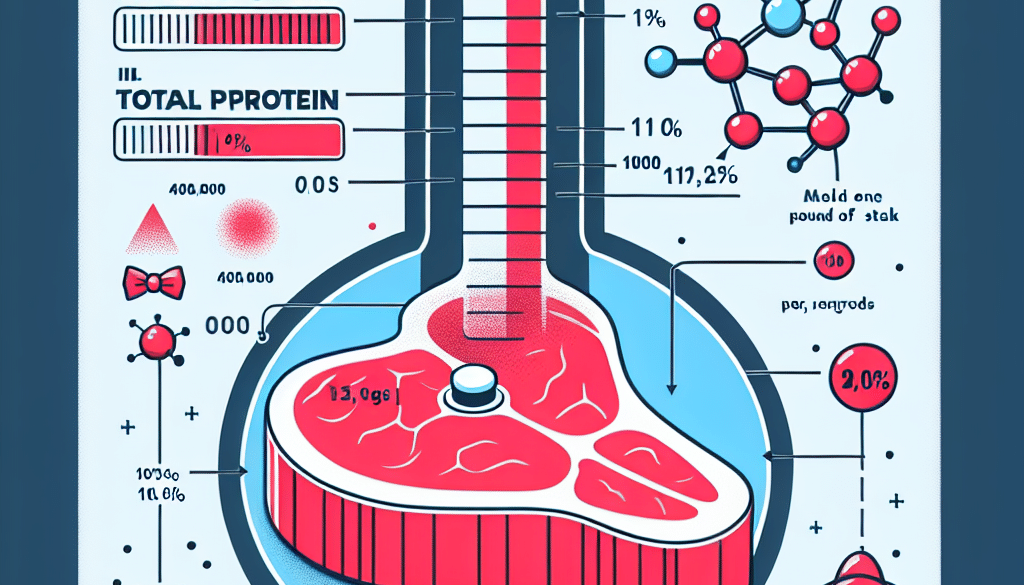Protein in 1 lb of Steak: A Comprehensive Guide
-
Table of Contents
- Protein Content in 1 lb of Steak: Your Ultimate Nutritional Guide
- Understanding Protein in Steak
- Protein Content by Cut
- Factors Affecting Protein Content
- Benefits of Protein from Steak
- Incorporating Steak into a Balanced Diet
- Conclusion: The Protein Powerhouse in Steak
- Discover ETprotein’s Plant-Based Protein Alternatives
Protein Content in 1 lb of Steak: Your Ultimate Nutritional Guide

When it comes to high-quality sources of protein, steak is often a top choice for fitness enthusiasts, bodybuilders, and anyone looking to increase their protein intake. Understanding the protein content in steak is crucial for dietary planning and ensuring that you meet your nutritional needs. In this comprehensive guide, we will delve into the specifics of the protein found in 1 lb of steak, the benefits of protein, and how to incorporate steak into a balanced diet.
Understanding Protein in Steak
Protein is a macronutrient essential for building and repairing tissues, making enzymes and hormones, and supporting overall health. Steak, which is a cut of beef, is particularly known for its high protein content. The amount of protein in steak can vary depending on the cut and how it’s cooked.
Protein Content by Cut
- Sirloin: A lean and popular cut, sirloin steak offers about 25 grams of protein per 3-ounce serving.
- Ribeye: Known for its marbling and flavor, ribeye contains roughly 23 grams of protein per 3-ounce serving.
- Filet Mignon: This tender cut provides approximately 22 grams of protein per 3-ounce serving.
- T-Bone: A T-bone steak offers a combination of tenderloin and strip, yielding about 21 grams of protein per 3-ounce serving.
Considering that 1 pound equals 16 ounces, you can expect a 1 lb steak to contain approximately 80-100 grams of protein, depending on the cut and the presence of fat and bone.
Factors Affecting Protein Content
- Marbling: The fat within the muscle, known as marbling, can affect the protein density. More marbling generally means less protein per ounce.
- Cooking Method: Cooking methods that lead to moisture loss, like grilling or broiling, can increase protein concentration by weight.
- Trimming: Trimming away fat reduces the overall weight, potentially increasing the percentage of protein.
Benefits of Protein from Steak
Protein from steak is not only abundant but also complete, meaning it contains all nine essential amino acids required by the human body. Here are some benefits of consuming protein from steak:
- Muscle Growth and Repair: The amino acids in steak support muscle protein synthesis, which is crucial for muscle growth and repair.
- Satiety: Protein-rich foods like steak can help you feel full longer, aiding in weight management.
- Metabolic Health: A higher protein intake can boost metabolism and increase the number of calories burned throughout the day.
Incorporating Steak into a Balanced Diet
While steak can be a valuable part of a balanced diet, it’s important to consider portion sizes and frequency of consumption. Here are some tips for including steak in your diet:
- Choose Lean Cuts: Opt for leaner cuts like sirloin or filet mignon to reduce saturated fat intake.
- Watch Portion Sizes: A single serving of steak is typically 3-4 ounces, much smaller than the steaks served in many restaurants.
- Balance with Vegetables: Pair your steak with a variety of vegetables to ensure you’re getting enough fiber and micronutrients.
- Vary Your Protein Sources: Alongside steak, include other protein sources like poultry, fish, legumes, and dairy to maintain a diverse nutrient intake.
Conclusion: The Protein Powerhouse in Steak
In summary, a 1 lb steak can provide a significant amount of high-quality protein, ranging from 80 to 100 grams depending on the cut and preparation. This macronutrient is essential for numerous bodily functions, including muscle growth and repair, and can contribute to a feeling of fullness and increased metabolic rate. However, it’s important to consume steak in moderation, choose lean cuts, and maintain a balanced diet rich in various nutrients.
Discover ETprotein’s Plant-Based Protein Alternatives
If you’re looking for plant-based protein options to complement or substitute for steak in your diet, ETprotein offers a range of high-quality vegan protein products. Their selection includes organic rice protein, pea protein, and other seed-based proteins that are non-GMO and allergen-free. These plant proteins are ideal for those following a vegetarian or vegan diet, or for anyone looking to diversify their protein sources.
About ETprotein:
ETprotein, a reputable plant protein vegan protein Chinese factory manufacturer and supplier, is renowned for producing, stocking, exporting, and delivering the highest quality organic bulk vegan protein and plant proteins. They include Organic rice protein, clear rice protein, pea protein, clear pea protein, watermelon seed protein, pumpkin seed protein, sunflower seed protein, mung bean protein, peanut protein etc. Their offerings, characterized by a neutral taste, non-GMO, allergen-free attributes, cater to a diverse range of industries. They serve nutraceutical, pharmaceutical, cosmeceutical, veterinary, as well as food and beverage finished product distributors, traders, and manufacturers across Europe, USA, Canada, Australia, Thailand, Japan, Korea, Brazil, and Chile, among others.
ETprotein specialization includes exporting and delivering tailor-made protein powder and finished nutritional supplements. Their extensive product range covers sectors like Food and Beverage, Sports Nutrition, Weight Management, Dietary Supplements, Health and Wellness Products, and Infant Formula, ensuring comprehensive solutions to meet all your protein needs.
As a trusted company by leading global food and beverage brands and Fortune 500 companies, ETprotein reinforces China’s reputation in the global arena. For more information or to sample their products, please contact them and email sales(at)ETprotein.com today.












